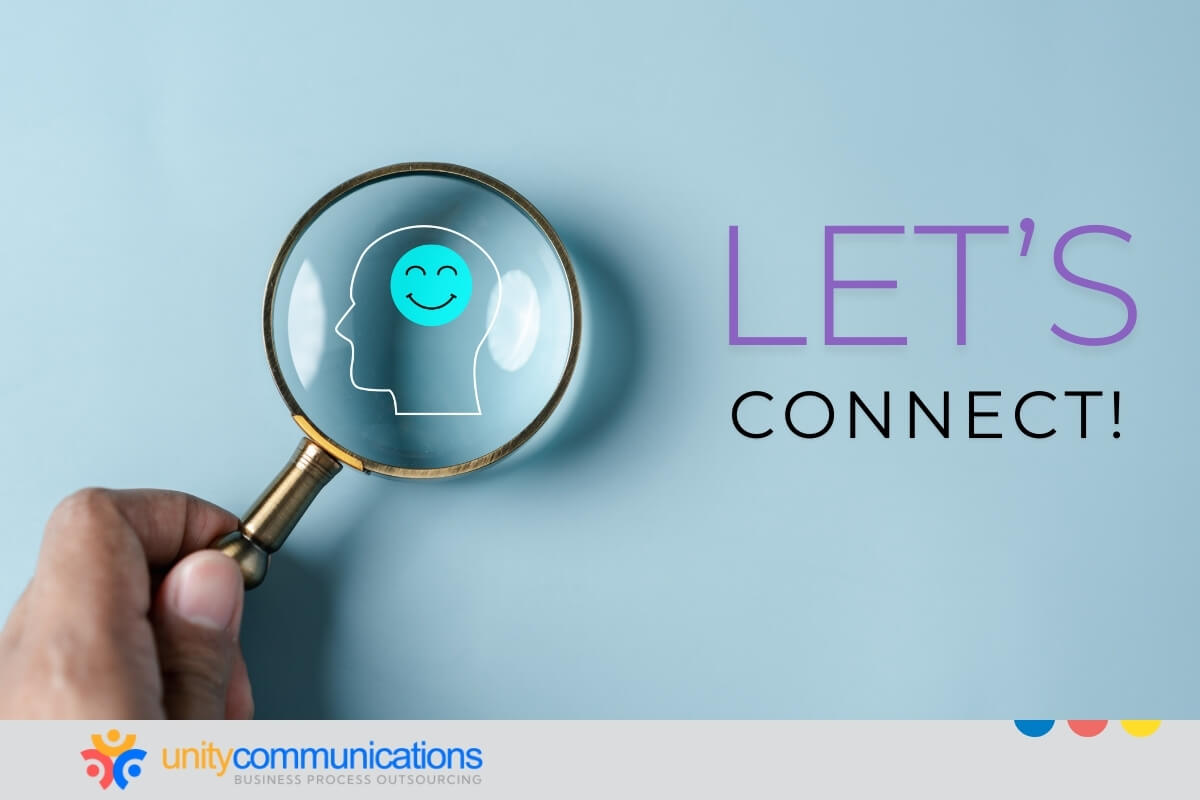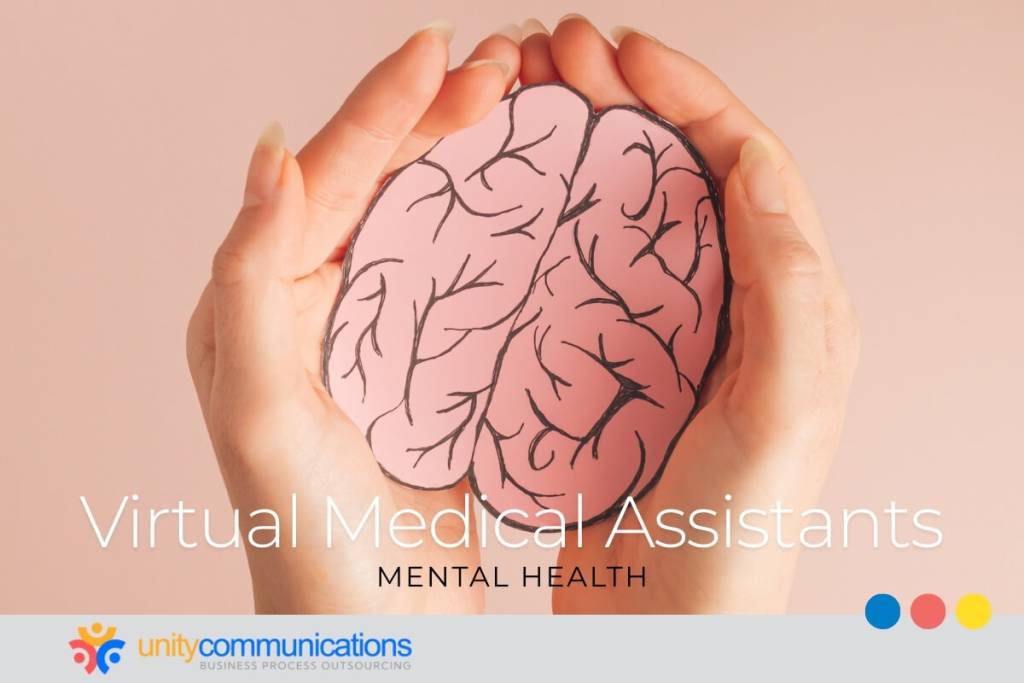Table of Contents
Mental health practices are vital in providing quality care to patients in need. However, geographic limitations, provider availability, and the stigma surrounding mental health can hinder care delivery.
Virtual medical assistants help mental health practices overcome these difficulties. They offer comprehensive administrative support, allowing providers to focus on patient care. Moreover, they play a significant role in making mental health support accessible.
If you want to learn more about how virtual medical assistants can help your mental health practice, this article is for you. It explores the functions they cover and the benefits of leveraging their expertise.
What are virtual medical assistants?

Virtual medical assistants are qualified remote professionals dedicated to providing administrative and clinical support to healthcare practices. They are well-versed in industry terminology, standards, best practices, and regulations, especially the Healthcare Insurance Portability and Accountability Act of 1996 (HIPAA).
These professionals are often recruited through third-party services, such as business process outsourcing (BPO). But what is BPO? It is the practice of delegating non-core processes to an external team. In healthcare, BPO teams comprise virtual medical assistants who become an extension of your internal staff. That’s how outsourcing works.
Outsourcing providers leverage the latest technology and the most popular tools to seamlessly integrate with your systems. These include the following:
- Electronic health records (EHRs) are a centralized platform for storing and managing patient information, including medical history, medications, and treatment plans.
- Videoconferencing platforms allow virtual assistants to conduct remote face-to-face sessions with patients.
- Teletherapy tools are a staple in BPO in telemedicine, designed for conducting therapy sessions remotely.
- Remote monitoring tools help virtual medical assistants track patients’ mental health progress and identify issues.
- Cloud technology is a computing model in which resources, such as servers, storage, and databases, are accessed over the Internet.
Critical functions of virtual medical assistants in mental health practices
Outsourcing administrative tasks in healthcare to virtual assistants can be advantageous, as they are prepared to support a myriad of business functions. Let’s explore the different processes these professionals can do for your practice:
Appointment scheduling and management
Virtual medical assistants leverage booking software to efficiently manage your facility’s schedules and coordinate with patients. They consider time zones and patient preferences when scheduling appointments to ensure convenience and prevent no-shows.
They also send customized reminders and notifications, as their tools allow them to automate these tasks. Lastly, BPO teams handle rescheduling and cancellations, promptly notifying all involved parties.
Initial screening and assessments
Healthcare BPO services include collecting and reviewing intake forms to gather information about a patient, including the following:
- Demographic information
- Medical history
- Mental health history
- Family history of mental health
- Presenting symptoms
- Social history
- Substance use history
- Goals for treatment
- Consent for treatment
Virtual medical assistants can also standardize assessment tools for your mental healthcare practice. These tools provide an objective and reliable way to measure the severity of a patient’s symptoms and determine the appropriate action. BPO assistants can also offer preliminary diagnoses and recommend suitable treatment options based on the assessment.
Medication management
Outsourcing teams can assist with medication management, reviewing patient medication history to identify interactions with the prescribed medication. That includes checking the usage of other medicines, including over-the-counter drugs, supplements, and herbal remedies.
They can also identify contraindications that might make a medication unsafe for a particular patient, such as allergies, medical conditions, or pregnancy.
You can also rely on virtual medical assistants to monitor side effects and guide patients on how to manage them. Lastly, they can develop strategies to help patients improve medication adherence.
Benefits of leveraging virtual medical assistants in mental healthcare

The nature of outsourcing offers many advantages for your mental healthcare practice, which is why it has become widespread across various industries. According to Statista, the global BPO market volume could reach $490 billion in 2029.
Choosing the right virtual assistant and BPO vendor is the key to maximizing the many otsourcing benefits. Remote professionals and outsourcing partners possessing the necessary skills, experience, and resources can deliver the following advantages:
1. Increased patient access
Accessibility in mental healthcare is essential for early intervention, reducing stigma, improving overall well-being, and preventing crises. The virtual nature of remote assistant services offers significant advantages in this aspect.
Here are several ways virtual medical assistants can improve patient access:
- Breaking geographical barriers. Virtual assistants can help you reach patients from remote or rural areas and accommodate those with physical disabilities and impairments.
- Streamlining appointment processes. Through efficient coordination, BPO teams can make appointment scheduling more convenient and accessible for patients with busy schedules.
- Providing technical support. Outsourcing teams can assist patients with technical issues they might encounter using portals or during appointments, creating a hassle-free experience.
2. Enhanced patient engagement
Building a solid therapeutic relationship with patients is essential for successful mental health treatment. Virtual medical assistants can help your mental healthcare facility achieve this in many ways. For one, improving accessibility and convenience encourages patients to seek the services they need more actively.
Another way they can enhance patient engagement is through proactive communication. They can contact patients between sessions to address concerns, support, and monitor progress.
Additionally, the healthcare process in BPO of collecting patient information virtually can make patients more comfortable and less judged or stigmatized. This makes it easier for them to communicate openly and share their feelings more freely.
3. Stronger data privacy practices
Data security is critical in the healthcare industry due to the sensitive nature of the information involved. Virtual medical assistants are vital in maintaining patient confidentiality. They can help ensure strict data privacy practices through the following:
- Secure platforms. BPO teams utilize platforms designed to protect patient data. These tools often employ encryption, the technology of transforming readable text into codes, to prevent unauthorized access and disclosure.
- Access controls. Virtual medical assistants implement strict access controls to limit who can view and access patient information. Only authorized personnel within your mental healthcare practice can access sensitive data.
- Data breach response plans. Reliable outsourcing providers have robust data breach response plans for prompt and effective resolution. This system includes notifying patients, containing the breach, and taking steps to prevent future incidents.
4. Improved staff diversity and cultural compatibility
Diversity in the mental healthcare workforce can significantly improve patient care and experiences. According to Behavioral Health Business, patients of color refrain from seeking treatment because of their lack of trust in medical service providers.
Outsourcing can help you by providing better access to global talent pools. This empowers you to recruit staff with diverse skills, experiences, perspectives, and multilingual capabilities.
- Cultural knowledge. Virtual assistants for Phoenix healthcare facilities understand the city’s ethnicities. They can use this knowledge to match patients with mental health professionals who share their cultural backgrounds.
- Language proficiency. BPO teams from Mexico can communicate effectively with patients of Hispanic descent who might not speak English fluently. This capability can also help better understand cultural nuances and avoid misunderstandings.
- Cultural sensitivity. Virtual medical assistants are trained to understand the cultural context in which patients live, including their beliefs, values, and customs. They also know to avoid cultural stereotypes and generalizations and respect cultural differences.
The bottom line

Virtual medical assistants can be the key to moving your facility toward more effective mental healthcare. While they may not directly provide mental health services, their role in streamlining administrative tasks and the nature of their work offer significant benefits.
These outsourcing teams can help improve service accessibility, enhance patient engagement, maintain confidentiality, and foster diversity.
Do you want to learn more about virtual medical assistants and what they can do for your mental healthcare practice? Let’s connect and find a solution that meets your goals and needs.




